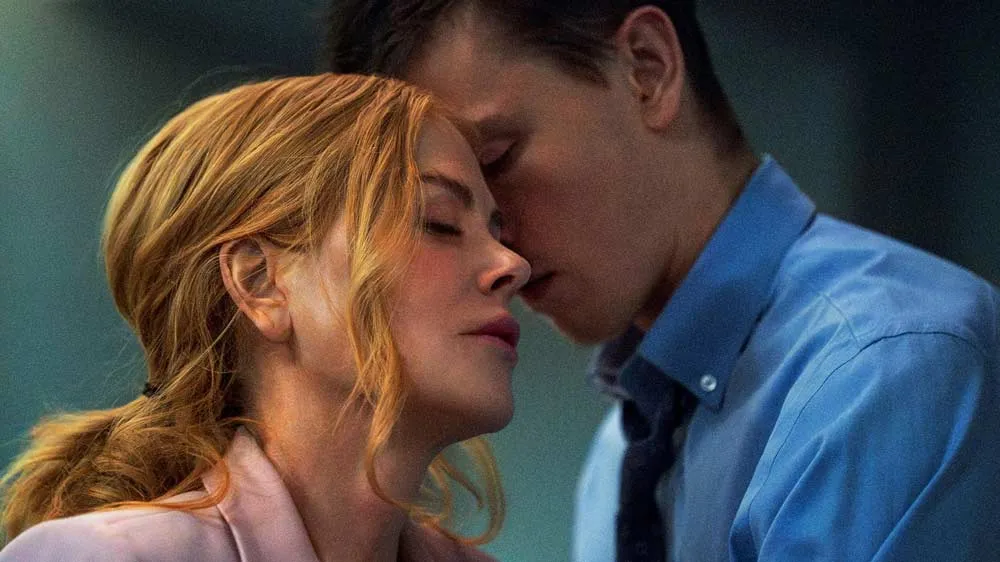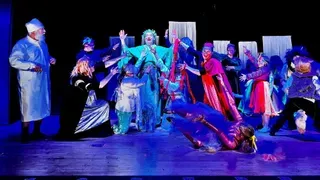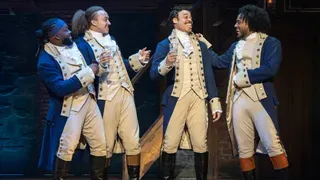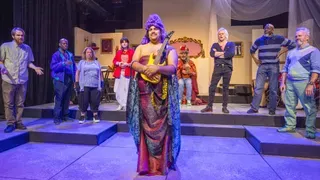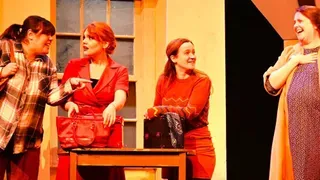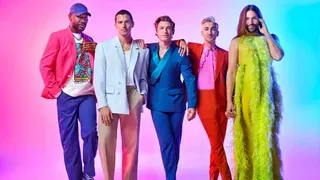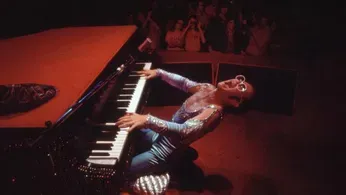
December 13, 2024
Review: 'Elton John: Never Too Late' Takes a Breezy Bird's-Eye View of a Legend's Life and Career
Kilian Melloy READ TIME: 4 MIN.
Co-directors R.J. Cutler (the documentarian behind "Martha" and "Billie Eilish: The World's a Little Blurry") and David Furnish assemble a documentary look at Sir Elton John's 50-year reign, paralleling his 1975 American tour with his Farewell Yellow Brick Road tour, which launched on Sept. 8, 2018, from Allentown, PA, and ended at Stockholm's Tele2 Arena on July 8, 2023.
The doc touches on some weighty issues – domestic abuse, drug use, homophobia in the music industry and in the culture at large – but keeps things moving breezily along. It's a bird's-eye overview of John's remarkable career, zeroing in on many compelling moments but flying right over others with little or no comment. Co-director Furnish being John's husband (and one of the producers of the 2019 Elton John biopic "Rocketman," along with John himself), one can't help wondering whether the Elton John camp has too firm a grip on the superstar's life story.
Both tours paralleled here included shows at Dodger Stadium in Los Angeles; John played the stadium on Oct. 25 and 26, 1975, and then revisited the venue for his last American concert on Nov. 20, 2022.
Some of the intervening years are glimpsed here, but the focus is on John's early years: dealing with a stressful home environment, watching ragtime great Winifred Attwell's performances on TV and wishing he could play like her, attending the Royal Academy of Music, playing pubs at age 15, and, with his band, backing the likes of The Inkspots, The Temptations, and Patti LaBelle and the Bluebelles.
Then came the famous ad in New Musical Express, which John answered, looking for a songwriting gig. He was confident in his musical abilities, but not so much when it came to song lyrics. When he was paired up with lyricist Bernie Taupin, "magic" happened and the two became best friends, sharing a room in John's parents' apartment for a time.
An awkward moment ensued, the doc recalls, when John told the straight Taupin he loved him. "He told me I should see a doctor," the singer says. But John didn't mean anything sexual; he'd simply never had a best friend before. The moment is touching, and telling, but not enough is made of that, nor of John's subsequent treatment by a homophobic record industry when he so much as hinted that he might be bisexual. (All we get on this count is that executives were "uneasy" and some American radio stations burned his records.) John reckons that his musings hurt his career, but whatever damage was done has long since been repaired, and it would have been enlightening to hear more about how attitudes within the industry – and in society at large – shifted, with John himself no doubt being one of the reasons for an eventual greater acceptance of queer artists.
As a young artist, John made a self-titled debut album that didn't do much... until it hit America. That's when things took off, sparking a half-decade of prolific writing and recording ("Four albums in one year!" "Thirteen albums in five years!" Countless hit singles!). Hard work, long stretches on the road, massive success, an abusive love affair, and a cocaine habit all followed.
The doc unfolds with audio narration set to archival visuals, and clips from old interviews and performances are thrown in. John is talking to Alexis Petridis, who helped write John's 2019 memoir, "Me," and from time to time Petridis interjects a comment or a question. At certain junctures, animation takes over to fill in and dramatize key anecdotes. The hits are here – "Crocodile Rock," "Candle in the Wind," "Rocket Man," "Tiny Dancer," and, of course, "Your Song," the breakout early single that also ends the film.
Of contemporary Elton John, we see surprisingly little. He's glimpsed making video calls to the young sons he shares with Furnish; he's in a radio studio for Apple Music, playing songs from acts he feels would otherwise be overlooked by mainstream radio. (He's no doubt right about that.) But the film's focus on 1975 is a constant, and it's so intense that scenes are labeled by the number of months before that famous performance at Dodgers Stadium, taking on the nature of a countdown.
There's a dramatic payoff to this when John recounts to Petridis how, the day before the show, he overdosed on pills and threw himself into a swimming pool. He was rich, famous, successful artistically and commercially – and miserable. "My career was killing me," John recalls; "All I lived for was my chart position and sex and cocaine.... I just wanted someone to put their arm around me." Still, the show had to go on, and he was on stage the following day to play that historic date at Dodgers Stadium.
If any similar drama attended his 2022 followup visit to the venue, we don't hear about it; we do see snippets of John performing some of his greatest hits, and at the end of the show he brings Furnish and their sons onto the stage. It's only fair, he reckons. After all, he's retiring from touring in order to spend some quality time with them late in his long, accomplished life.
With only two hours, it's inevitable that the doc will gloss over or omit major events, and whole creative epochs, in the pop icon's life. There's no "Lion King" here, no Princess Di and "Goodbye England's Rose" remake of "Candle in the Wind." There's no mention of how John and Furnish met, and even his various celebrity encounters – sharing the stage with John Lennon, having Andy Warhol drop in on him while he was high on coke in a hotel room – have a skip-and-jump feel about them. They're notable, but what do they add up to?
There are an awful lot of good memories here, though, along with some unvarnished bad ones, and if nothing else the amusing anecdotes offer a few insights into John's life and creative output.
"Elton John: Never Too Late" premieres on Disney+ on Dec. 13.
Kilian Melloy serves as EDGE Media Network's Associate Arts Editor and Staff Contributor. His professional memberships include the National Lesbian & Gay Journalists Association, the Boston Online Film Critics Association, The Gay and Lesbian Entertainment Critics Association, and the Boston Theater Critics Association's Elliot Norton Awards Committee.
